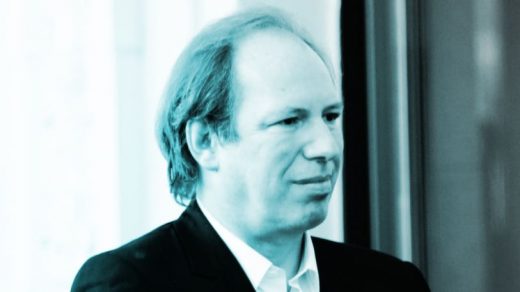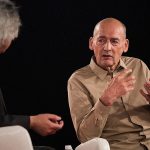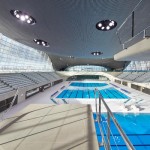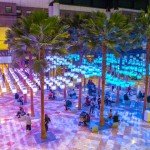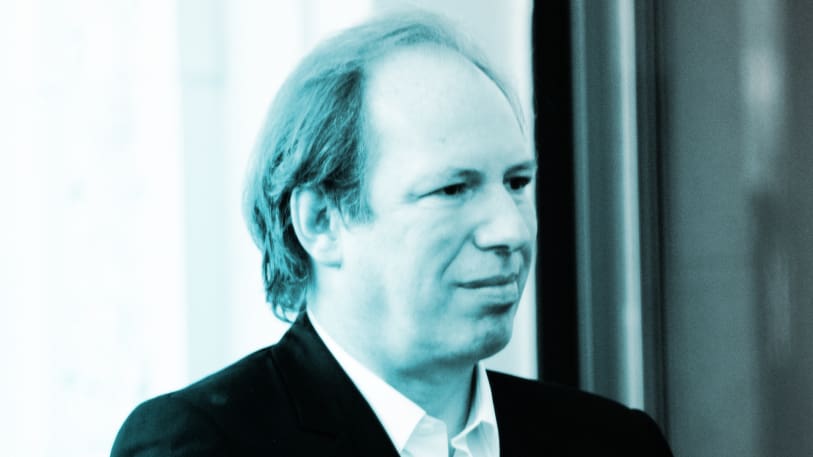“I’m Really A Rock ’N Roller”: Movie Maestro Hans Zimmer Takes Coachella
Hans Zimmer’s “library”—a windowless bunker in an anonymous building on an otherwise industrial stretch of Santa Monica, about 14 blocks from the beach—exudes the old world, mahogany refinement of a secret gentlemen’s club.
Arrayed with velvet furniture and Persian rugs, flickering candles and vast banks of vintage musical equipment (like the Moog synthesizer Mick Jagger played in the experimental 1970 drama Performance), this dimly lighted space built by “three heavily boozing French carpenters” has incubated every note of the Oscar-winning soundtrack composer’s musical output since 2001. That was the year Zimmer took over the building from director Ridley Scott (with whom the German producer, incidentally, has collaborated on six films).
If these walls could talk, they might very well start belting out the sea shanties Zimmer composed for Pirates of the Caribbean: Curse of the Black Pearl and its multi-billion-dollar franchise of sequels. Or perhaps they’d bellow the dread-inducing horn surges and string swells Zimmer committed to tape for Christopher Nolan’s Dark Knight film trilogy. Or maybe even foot-stomp along to the banjo/fiddle/out-of-tune piano trinity Zimmer devised for 2009’s neo-noir Sherlock Holmes.
The quality, diversity and sheer profligacy of his work have been maintained for so long, it boggles the imagination to consider all the movie and TV music that’s issued forth from this place (and six adjoining buildings Zimmer owns): soundtracks for 12 Years a Slave, Netflix’s popular series The Crown, Batman v Superman: Dawn of Justice, the BBC documentary Planet Earth II, Iron Man, Interstellar and The Simpsons Movie, just to name a tiny portion of that discography.
So in January, it came as something of a shock to discover the four-time Grammy winner, would be exiting his library’s cloistered solitude to pick up instruments for himself and claim the spotlight before arena-sized audiences around the world.
This Sunday, accompanied by a 22-piece orchestra and full choir, the 59-year-old composer will perform a career-spanning cavalcade of greatest film score hits at this year’s Coachella Valley Music and Arts Festival (and on the desert hipster Mecca’s second weekend April 23) before heading out on a 55-date tour that will see him travel to San Francisco and Las Vegas this month, Australia in May, then Europe through the end of June, before doubling back to North America for more dates into the late summer.
On a recent, cloudless SoCal afternoon, I met with Zimmer to get the 411 on precisely what compelled him to come out of the proverbial shadows, pass up the kind of lucrative scoring gigs that have remained his stock-in-trade since the ‘80s and hit the road as a performer. “I wasn’t compelled,” the composer said in Teutonic-inflected but otherwise perfect English. “I was forced! I was cajoled! I was bullied by three of my best friends, Ann Marie Simpson, Johnny Marr and Pharrell Williams.”
Williams, of course, is the multiplatinum-selling Top 40 hitmaker who collaborated with Zimmer on soundtracks for Despicable Me 2 and last year’s Academy Award-nominated biopic Hidden Figures. Marr is best known as ex-guitarist for the seminal British post-punk band the Smiths; he co-composed the music for 2014’s The Amazing Spider-Man 2 with the Frankfurt native. Classically trained violinist-come-rock musician Simpson, meanwhile, has toured as a featured soloist with the likes of AR Rahman, Damian Marley and Dave Stewart and now tours as part of Zimmer’s symphony orchestra. Hence, they know of what they speak.
“Pharrell said things like, ‘You know, eventually you have to look your audience in the eye. Eventually, you have to start doing things in real time, as opposed to hiding behind the screen.’ And one of them—I don’t know who—said, ‘You’ve got to get out of the windowless room,’” Zimmer continued, adding: “He was absolutely right. Because I was talking about having stage fright.”
To be sure, the American and southern hemisphere engagements aren’t the composer’s first live performances—just his first outside Europe. Zimmer, who claimed an Academy Award in 1995 for his soundtrack to the animated blockbuster The Lion King, and whose Golden Globe and Tony Award tally attest to his status as Hollywood’s most blue-chip scoring bay ace, headlined two sold-out performances at London’s Hammersmith Apollo in 2014. And earlier this year, he kicked off the tour (called “Hans Zimmer Revealed” in the US and Australia and that he jokes is billed as “Oh No, Here He Is Again” in Europe) with two more sold-out shows at London’s 12,500-capacity Wembley Arena that arrived to critical raves. “A beautiful, intricate symphony of visual delights,” opined The Times of London. “A wonderful night that feels like being in a whirlwind of interlocking dreams,” gushed The Guardian UK.
Just don’t show up to the gigs expecting anything resembling your standard symphonic music recital, he warns. “If you see a classical music concert or a film music concert, really the whole evening is spent looking at a man’s back and a bunch of musicians reading the paper,” Zimmer said, blazing up the first of several Marlboro Lights he smoked over the course of an interview. “It’s a bit like a bad marriage. I thought, ‘Where’s the entertainment in that?’
“Secondly, I’d seen some of these things like for Gladiator or Pirates—they have big screens and they show footage. The movie starts. And within five minutes, if the movie is any good, I’m totally in the movie. The only time I noticed the musicians was when someone played a wrong note! That’s not what I want to do.”
To manufacture the sense of spectacle he was looking for—a multi-layered, multimedia experience Zimmer declined to elucidate in any specific detail—the composer enlisted acclaimed production designer Marc Brickman (who earned his stripes creating performance visuals for Pink Floyd, Cirque du Soleil and the Barcelona and Nagano Olympics) to “reimagine the movies we’ve done with lighting.”
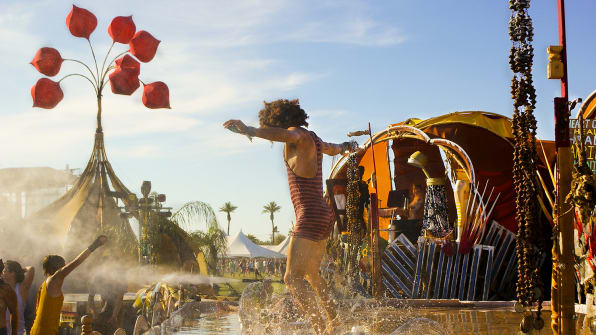
And in further defiance of established classical music protocol, Zimmer says he will eschew what should be his place of pride—at the conductor’s podium—to play a variety of instruments onstage himself. “I play bad piano, synth. I can’t help it; I play guitar. And I play that lowliest of instruments, the one that’s only there for ridicule, I play the banjo,” he said with evident glee. “What’s the worst that can happen? For the audience, to see a guy have a meltdown on stage. That could be quite exciting.”
It’s clear Zimmer is pleased to upend any set expectations of him as any kind of John Williams-esque eminence, pointing out that symphonic music was something like the original punk rock with rioting in the streets greeting new compositions by Igor Stravinsky and Richard Strauss in the 19th century. And given Zimmer’s background as a journeyman synth player in various ‘80s New Wave bands—he can briefly be seen in the music video for the Buggles’ “Video Killed the Radio Star”—the music producer insists live gigs aren’t exactly a new thing for him.
But when I point out that his name stands out on the Coachella line-up—North America’s preeminent showcase for independent music, alt-rock, EDM and hip-hop—in a “One of these things is not like the others” kind of way, the composer nearly bristled with umbrage. “Really, what I do is a rock show. One of the things I’ve been hiding is I’m really a rock ’n roller,” Zimmer said. “That’s where I come from. We are not polite, we are noisy! You can’t get any more alternative than us! And you can’t get any more independent than us! I’ve never had a record deal beyond a single project.”
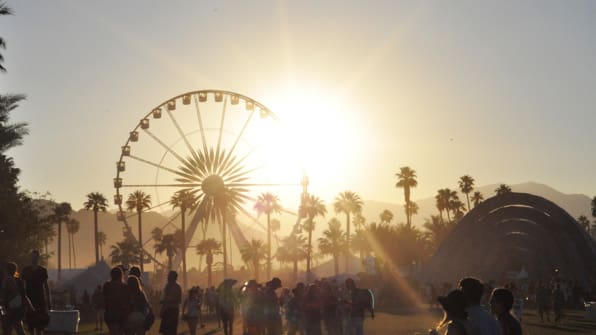
Still, the whole sudden performance tilt of Zimmer’s career begged certain questions. For his ownership claim to a blockbuster filmography that has generated $ 24 billion in global box office receipts as well as name-brand recognition as the world’s most identifiable working soundtrack composer, I wondered: had Zimmer simply run out of challenges scoring television and movies? Was the decision to tour some kind of mid-life crisis?
The producer demurred, pointing out that Planet Earth 2 and Hidden Figures—“a period piece about African-American women and mathematics”—that sounds like commercial kryptonite on paper but which had turned into an unexpected commercial hit and awards darling, were two of the “most relevant projects” he’d ever worked on. And with scoring recently completed on Nolan’s much-anticipated World War II epic Dunkirk, Zimmer had no plans to permanently trade soundtracks for the tour bus life anytime soon.
“No, I don’t have to go out on the road,” Zimmer admitted. “I can stay in this room. As you know, it’s pretty comfy. But I took it to heart when the Gang of Three said, ‘Eventually you have to look your audience in the eye.’ All my life, I’ve lived dangerously and on the edge of some experiment that is just about to go wrong. So this is just pushing everything a little bit further.”
(48)

